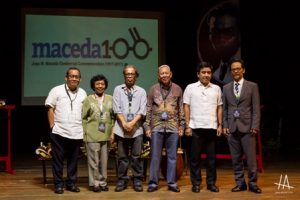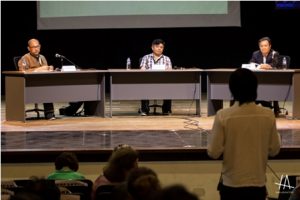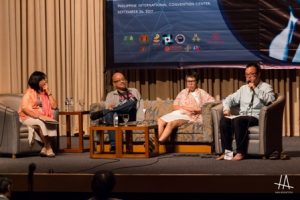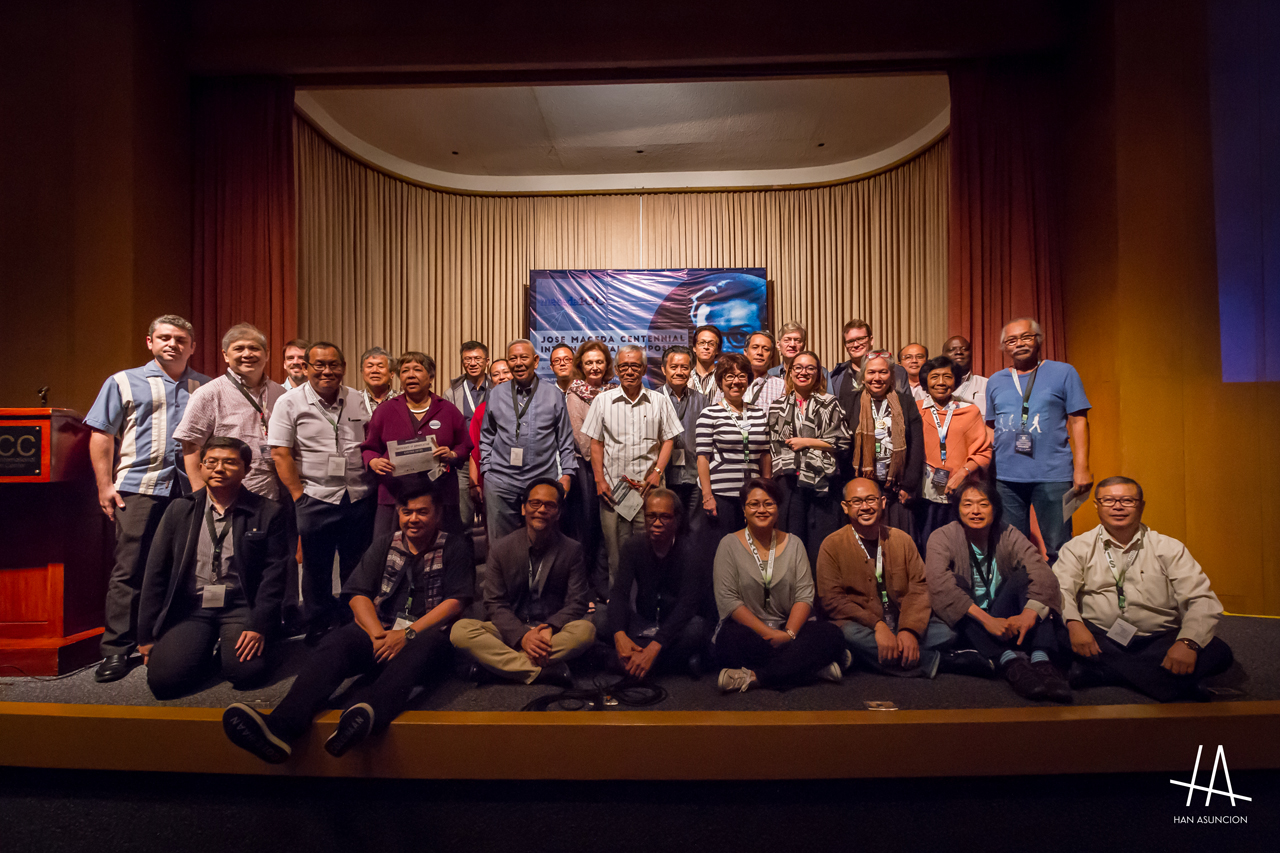As the last quarter of the year commenced, the U.P Center for Ethnomusicology mounted the last few events to celebrate the birth centenary of National Artist and UPCE founder, Dr. Jose Montserrat Maceda. Last September 25 to 26, the U.P Center for Ethnomusicology organized the Jose Maceda Centennial International Sympsium (JMCIS), a symposium that aims to forge linkages with people and institutions to celebrate the legacy of the highly respected and loved National Artist, Jose Monsterrat Maceda. The symposium garnered 24 speakers from different parts of the world to celebrate the legacy of a man instrumental in perpetuating theories and philosophies that have inspired Asian and Western scholars to look deep into the Asian tradition. His life, rich with meaningful correspondences and connections inspired the 24 speakers in more ways than one to tread a path similar to his.

What does it mean to talk about Dr. Jose Maceda at this day and age? What kind of man was Jose Maceda and what influence did he exert on musicians, artists and scholars around the world? These were only some of the questions answered rather satisfyingly in the fully-packed panel sessions, the first day of which was held at the U.P Abelardo Hall and the second and last day at the PICC. The symposium followed a panel discussion format but had the casual and conversational atmosphere of a roundtable discussion.
Participants included school teachers, students, sound and visual artists, researchers, musicologists, performers, curators and other cultural workers coming from different parts of the world; the composition of invited speakers were equally as varied. The panel sessions were organized according to the confluences of Dr. Maceda’s influence in many fields. Initially conceived as homage to a well-loved National Artist, the symposium became an appreciation and realization of the extent of his influence in many different fields.
Day 1

The keynote speech for the first session titled, “Time, Space and Community” was given by Professor emeritus and National Artist Dr. Ramon Santos. Dr. Santos discussed how the music and works of Dr. Maceda helped usher in a new kind of thinking-one that is “decolonized” from the prevailing Western hegemonic musical thought but resonates with Philippine and Asian musical traditions. He also posits Dr. Maceda’s theory of drone and melody as the central, unifying theory not only in music but in the social structure that governs the Southeast Asian region. This emphasized how the lives of Southeast Asians are closely linked with the natural world. He further discussed how Dr. Maceda translated his philosophical constructs, namely time, space and community into his compositions.
Session 2, titled “Traditional Music and Modern Composition in Asia”, whose speakers included Sam Ang Sam (Cambodia), Conrado del Rosario (Philippines) and Anant Narkkong (Thailand) was moderated by Ms. Mary Katherine Trangco. This session presented perspectives from practitioners and composers of Asian music- bringing forth issues like “Asia” as a unified musical area, introspection into one’s own respective culture and its role in creating “one Asia”, and the process of artistic creation in the modern times. These points were elucidated through personal stories and encounters with a marked sense of gratitude and homage to Dr. Maceda as a mentor and inspiration. The open forum also opened the discussion of the crucial question – What does “Asia” represent? And consequently, what are the implications of using Western terminologies as a heuristic tool to define “Asia” and does it serve the purpose of setting it apart as a region, different from the West? Concurrent with the efforts to facilitate a return to the Asian/traditional roots and rediscovering collective identities, the use of unconventional materials and philosophies in compositions were also discussed.
The third session titled “Asian Music, the Asian Scholar and Modern Asia” featured keynote speaker Dr. Ricardo Trimillos. He discussed the criteria used in defining the terms “Asian”, “Asia” and the “Asian Scholar. He problematized the different ways these terminologies and their definitions have to be negotiated. Similarly, he whittled the ascribed definitions of Asia and of the Asian scholar and the position he/she occupies as well as his/her trajectory in postmodern Asia.
Session 4, titled “Traditional Culture in the Public Sphere” talks about how Maceda is decoded and discussed in the public sphere. The discussions by Joe Peters (Singapore), Elena Mirano (Philippines), Neal Matherne (USA) and Anak Charanyananda (Thailand) , moderated by Prof. Patricia Silvestre, centered around Dr. Maceda’s preponderance for pushing sonic boundaries through his seminal research work in the villages, facilitating interaction with the community and linking music to the concepts of time, space, and social organization. His legacy- the U.P Center for Ethnomusicology and its role in the larger community as an archive, is also instrumental in inspiring his predecessors to mediatize music collections in the effort to preserve musical heritage.
Mr. Kedmon Mapana (Tanzania), Mr. Thiti Panyain (Thailand) and Ms. Jocelyn Guadalupe (Philippines) were the chosen speakers for Session 5 titled “Ethnomusicology in the Classroom” which was moderated by Mr. James Diaz. Discussions revolved around the speakers’ respective experiences regarding the role of music and ethnomusicology as well as that of local and indigenous knowledge and language in the classroom.
Day 2

Dr. dela Pena opened the second day of the symposium on Session 6 titled, “Ethnomusicology and the Digital Age” by stating how ethnomusicology is preoccupied with freezing the ephemeral phenomenon of music in time. It is notable that Dr. Maceda paved the way for present researchers to preserve and conserve field materials in online archives. Dr. Nicole Revel gave a keynote speech describing the parallel efforts of preserving voice and vocal literature in France and the available multimedia and technological tools to the present-day researcher. She discussed the different historical landmarks that map the changes in the role of scholars and researchers and how these roles accordingly change philosophies and ethical positions in the field.
Session 7 “Technology, Sound and Contemporary Asia” expounded the broad implications of technology in ethnomusicology and research in present-day Asia. Speakers Dayang Yraola (Philippines), Tad Ermitaño (Philippines) and Yasuhiro Morinaga (Japan) along with moderator, Ms. Christine Muyco discussed the topic through different lenses- curatorial, archival, filmic and artistic. It was emphasized that the essence of Maceda and the value of his archive depends on its accessibility and function to the public. This panel discussion shared the many ways in which the Maceda collection and similarly Dr. Maceda’s influence transcends geographical and physical boundaries while emanating into the visual and multimedia arts. His influence was also pivotal in inspiring these artists to put forth their own personal contexts and creativity to transform the research material beyond its original context.
Session 8 titled “Alternative Voices, Alternative Theories”, which was moderated by Mr. Arwin Tan, featured speakers Made Hood (Malaysia/USA), Jose Buenconsejo (Philippines), and Jonas Baes (Philippines). This session prompted discussions on the divergent streams of thought that ethnomusicological theories have taken through the years. Directions like applied musicology and ecomusicology which facilitate sustainability and transmission, organology and how it puts forth a discovery of an indigenous modal system that will unify Southeast Asia as a region, and social criticism espoused by ethnomusicology and composition – all these exemplify roles that go beyond that of being merely an ethnomusicologist or composer.
The last and final session, Session 9 titled, “Remembering Jose”, moderated by Dr. Verne dela Pena featured Cynthia Zayas (Philippines), Manop Wisuttipat (Thailand), Prasit Leosiripon (Thailand), Franki Raden (Indonesia) and Kyle Heide (Ecuador). This session emphasized personal reminiscences about Dr. Maceda which provided different facets of his personality. Speakers talked about his indomitable community spirit, his “pusong nayon” as instantiated in his visit to villages, preferring to interact with locals rather than be given special treatment as a National Artist, and his fatherly influence and affection for his students. All these remembrances summoned a clearer understanding of why Dr. Maceda- a family man, a father figure to his students, a mentor, a friend and an inspiration, was the way he was and why his influence beholds us up until the present day,
The two-day symposium ended with an outflow of knowledge, emotion and realization. One of the most significant outcomes that emerged from the symposium was a newfound appreciation from where we all, individually and collectively, came from. What transpired in the panel discussions and open forum were emphatic exchange of stories and more importantly, new questions and explorations. After all, according to Dr. Maceda, the purpose of a symposium is not merely to “bridge a gap but to offer a new idea- presenting paths for musical creativity and musical programming which are not exact replicas of modern music programmes in Europe or U.S.” (Maceda,1966)

